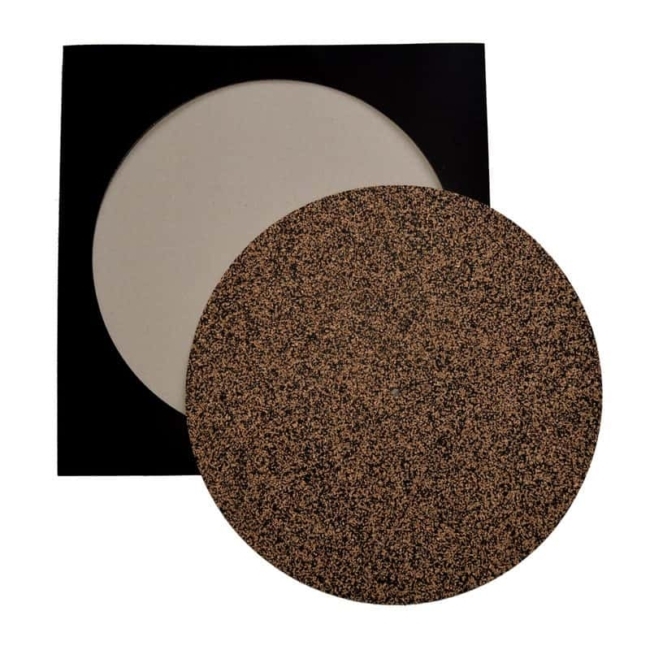Synthetic Cork Pads

Synthetic Cork Pads
One of the many cork products offered by Advanced Seals & Gaskets includes synthetic bonded cork pads, all of which can be supplied with a choice of plain or self-adhesive finishes, or even laminated to one of our materials.
Our synthetic cork pads are produced on-site using drawings, samples or dimensions provided by our customers, ensuring the final product is to their exact specification. Depending upon the size and quantity of pads required, one of many presses, bandsaws or CNC machines can be used to manufacture the final product, from one-off to multiple batches runs.
Depending upon the size of the cork pad required, they can be supplied as loosely cut parts or kiss-cut on rolls where a high quantity is required for use on fast-paced assembly lines.
What are Synthetic Cork Pads?
Synthetic bonded cork is a mix of synthetic rubber and cork granules bound together. The addition of rubber creates a speckled, darker appearance, and allows for the material to be used with fuel and oil, and where a watertight seal is crucial. Cork pads are cut from stock sheets or rolls, often used in the same way as a gasket, whereby they are used to create a seal between uneven surfaces and fill irregularities.
Our pads can be produced as squares or rectangles with the option of radius corners, and also as circular or oval-shaped pads or ‘discs’, in a range of thicknesses. Manufacturing pads in-house even means we can supply them in a plain or self-adhesive backed finish and even laminate multiple types of material together to create bespoke and unique variations.
Product Enquiry
For information on Synthetic Cork Pads please complete the following quick enquiry or call us on +44(0)1384 252555.
Product Specification & Key Characteristics
- Flexible and compressible
- Moderate resistance to weathering and fungus growth
- Compatible with a range of fluids
- Sound and vibration control
- Easy to fabricate in a range of sizes and finishes
- Suitable for low and medium bolt pressure
- Improved resistance to solvents and oil
Full technical data can be supplied upon request,
or downloaded from our online portal.
Why use Synthetic Cork Pads?
Synthetic cork sheets are stocked in a variety of thicknesses from which pads can be cut. Synthetic cork pads are popular as the material is lightweight, a cheaper alternative to some sponge, foam and rubber materials and offer excellent sealing properties against dust, air, gas and moisture, gap-filling between uneven surfaces or for reducing unwanted noise and vibration. Synthetic bonded cork is highly flexible and compressible, compatible with a range of fluids and has some resistance to weathering, acid and fungus growth. These blended corks are typically used in sealing applications, within the automotive industry and are also preferred in applications where there is exposure to oils, chemicals and liquids.
Different Grades of Cork Pads Available
Along with natural cork, there are other different grades of cork used within many industries each with its own unique characteristics, depending upon the material it is blended. Grades of cork include Neoprene Bonded, Nitrile Bonded and Resin Bonded
Neoprene bonded cork is suited to sealing at higher temperatures and resistant to weathering and oil. Neoprene Bonded cork is suited to oil, engineering, electrical, anti-vibration and soundproofing applications.
Resin-bonded cork – a lightweight, flexible cork, produced using cork granules bound together using a synthetic resin. This grade of cork is resilient to certain acids and is often used in water retaining applications.
Nitrile bonded cork – manufactured using a combination of cork and nitrile rubber granules, giving a speckled appearance. Gaskets made from this material can be used where oil and fuel resistance is required, or where high-temperature resistance is required, industries include automotive and general engineering.
Natural Cork – consists of grains of cork with no other added chemicals other than a liquid binder known as ‘agglomeration’ to adhere the particles together. Natural Cork is relatively cheap compared to sponge and rubber and can be used as a simple coaster, air/dust/water seals, thermal insulation, acoustic and anti-vibration applications.
Benefits of Using Synthetic Cork Pads
Advanced Seals & Gaskets work with a network of material suppliers and manufacturers allowing us to supply synthetic cork sheets in a variety of sizes, thicknesses a number of which are kept in stock enabling us to offer a quick turnaround for cut pads. Using synthetic cork pads offers many desirable qualities including thermal insulation, noise and vibration absorption properties and sealing against air, water and chemical leaks.
Cork is chemically inert, resistant to fungus and mould growth, flame retardant, anti-static, flexible and durable, often used to fill irregularities between surfaces, fill gaps, seal against water, gas and air, provide a smooth and even surface for fastenings, allowing for a better fit. Cork material is easy to cut and to work with, it holds adhesive well and due to its flexible nature fits and adheres to most surfaces.
Please contact us using the form below or by calling us on +44(0)1384 252555.





















